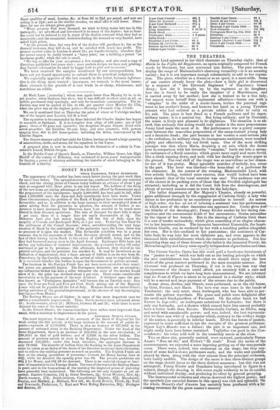THE THEATRES.
Jenny Lind appeared in her third character on Thursday night; that of Maria in La Figlia del Reggimento, an opera originally composed for French words by Donizetti, but now converted into Italian. The part serves to display the range of Mademoiselle's charming versatility—it is an amusing variety; but it is not important enough substantially to add to her reputa- tion. The piece, whether as a drama or as an opera, is a mere trifle. Some of our readers already know the plot;—how a little girl is discovered by a sergeant of " the Eleventh Regiment " of Napoleon's Grand Army; how she is brought up by the regiment as its daughter; how she is found to be really the daughter of a Marchioness, and is carried away by her mother; how she is trained to be a fine lady, but cannot wean herself from regimental affections—bursts out with a " rataplan" in the midst of a music-lesson, invites the paternal regi- ment to her mother's house, and bestows her hand on a young Tyrolese peasant who had enlisted as a private soldier in order to carry on his suit. The piece is best fitted to a French audience and its super- military tastes; it is a musical toy. But being military, and by Donizetti, the music is lively and pleasant in its slightness. The situation is so ab- surd, that seriously fine acting would only render it the more preposterous. Jenny Lind made the most of it. Her performance was a pretty compro- mise between the masculine propensities of the camp-trained young lady and a feminine freak; the part became in her version a semi-serious joke —its evolutions, its military slang, its incongruous sentiment, were touched lightly and effectively, but not dwelt upon. One of the most striking passages was that where Maria, despising a set aria, which she deems poor in comparison with her favourite " rataplan," burst out into a sarcas- tic caricature of a florid exercise; which grows more rapid and more fervid, like a clock running down, and ends with her dashing the music-paper to the ground. The real skill of the singer was as marvellous as her drama- tic use of it was pretty. Many agreeable snatches of melody, too, occur in the part. The lover was Gardoni—the beau-ideal of a performer for the character. In the course of the evening, Mademoiselle Lind, with true artistic feeling, resisted some encores, that would indeed have been most absurd: that of the vocal exercise was one!. The audience was one of the closest in its packing even of those that the Swedish nightingale has attracted; including as it did the Court folk from the drawingrocm, and plenty of country cousins come to town for the holydays.
The ballet department of Her Majesty's Theatre, already so powerful, gains additional strength by the engagement of Carlotta Grisi; a lady who shines in her profession by an excellency peculiar to herself. An actress of high order, she has an art of infusing a sentiment into her performance, in which node of the other dansenses can approach her. Cerito gives yot- - the hilarity of the dancing-girl; Fanny Elssler excites by her daring con- ceptions and the consummate finish of her movements; Grahn astonishes by the vigour of her bounds. But in the dancing of Carlotta Grisi there is a sort of tender melancholy, which gives something of an elegiac charac- ter to her impersonations. The innocent benevolent Esmeralda, the hearts stricken Giselle, can be rendered by her with a touching pathos altogether her own. Nor is this confined to her pantomime; the sentiment of Car- lotta finds its way into her most elaborate pas, and even appears in the thousand little embellishments which she executes to perfection. Not less surprising than any of these (Messes of the ballet is the immortal Perrot: his Mercnrian agility and fancy seem equally independent ofgravitation and time.


























 Previous page
Previous page